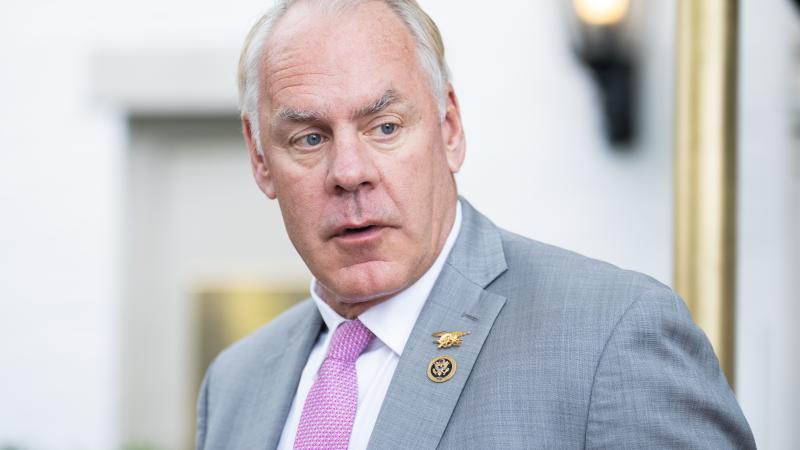Disinformation police ban survives in Defense spending bill, but one target disputes applicability
"The only way a military recruitment campaign would end up using our data would be if the military intentionally licensed our data for advertising," NewsGuard says.
Congress is on the verge of dealing a potential blow to the so-called Censorship-Industrial Complex – assuming the National Defense Authorization Act isn't sunk by its extension of warrantless surveillance powers and other bones of contention among some Republicans.
The conference report included a provision that would prohibit contracts for "military recruitment advertisements" with entities that place ads "in news sources based on personal or institutional political preferences or biases, or determinations of misinformation."
The compromise bill between House and Senate negotiators for the $886 billion funding measure was presented to the Senate and passed by the chamber Wednesday night.
The provision in the 3,000-plus page report specifically names NewsGuard and the U.K.-based Global Disinformation Index, which appear to try to starve primarily conservative media of ad revenue through NewsGuard's subscription "trust" ratings and GDI's secret blacklists.
It requires the Defense secretary to notify congressional leadership and defense committees whenever the department signs a contract with NewsGuard, GDI or "any similar entity" for recruitment advertising "if such entities are used how they are used."
The amendment was broader when Rep. Rich McCormick, R-Ga., offered it six months ago.
In addition to NewsGuard and GDI, it named Graphika, a founding member of the Department of Homeland Security-conceived Election Integrity Partnership, which identified Just the News among the 20 "most prominent domains" cited in purported election misinformation.
The original would have covered any entity that "advise[s] the censorship or blacklisting of news sources based on subjective criteria or political biases, under the stated function of 'fact checking' or otherwise removing 'misinformation.'"
McCormick spokesperson Julie Singleton confirmed to Just the News that the final bill was the conference report dated Dec. 6, posted by the Senate Armed Services Committee.
GDI didn't respond to Just the News queries, but NewsGuard said it doesn't think the final provision even affects its government work.
"NewsGuard does not have any contracts with the Pentagon relating to recruitment advertising, nor has it ever sought any," and its work has always "related to disinformation operations against the U.S. by hostile state actors such as Russia, China and Iran/Hamas," General Manager Matt Skibinski wrote in an email.
The provision has been overshadowed by a variety of other NDAA fights, including an intra-Republican debate on whether and how to reform Foreign Intelligence Surveillance Act Section 702, which authorizes indirect eavesdropping on Americans who communicate with foreign surveillance targets, all without court approval.
House Speaker Mike Johnson, R-La., pulled competing reform bills from votes and said the House will just extend FISA through mid-April to prevent the law's expiration at month's end.
The White House supports Section 702, as do four of the signatories on the 2020 letter by former intelligence leaders who deemed the Hunter Biden laptop Russian disinformation.
NewsGuard and GDI have been in the hot seat since February, when the Washington Examiner exposed their role in steering advertisers away from conservative media.
Within the month, the State Department-funded National Endowment for Democracy cut off its GDI funding and Microsoft's Xandr temporarily suspended its use of GDI's so-called blacklist but hasn't said since whether it resumed.
In May, Examiner reporter Gabe Kaminsky said an ad industry whistleblower leaked a "disinformation" blacklist of conservative media that GroupM, the world's largest media buying agency, used before the 2020 election. GroupM's clients include Ford, Google, Coca-Cola and Airbnb.
Left-leaning Consortium News sued NewsGuard and the feds in October for a Defense Department Cyber Command contract that allegedly branded its 10,000-article archive as disinformation based on six articles about "Russia, Ukraine and Syria." NewsGuard's Skibinski told Just the News the contract was "unrelated" to its news-site ratings and "instead focused on tracking false narratives in state-sponsored media sources."
Conservative media outlets and Texas sued the State Department and its Global Engagement Center last week for funding, promoting "and/or" marketing NewsGuard and GDI.
"Certification Requirement Regarding Contracting for Military Recruiting," as the NDAA advertising provision is titled, made it through "tense negotiations" between House Republicans led by Johnson and Senate Democratic leader Sen. Chuck Schumer, of New York, and Majority Whip Sen. Dick Durbin, of Illinois, the Examiner reported Monday, citing "eight congressional staffers and sources familiar" with negotiations.
"Schumer and Durbin were really pissed about" the amendment, one person said, while two others privy to NewsGuard's discussions with McCormick gave different versions of what the company sought, according to the report: kill the amendment or just limit it to recruiting.
The amendment is important because the Biden administration "in certain instances" blocked the military from placing recruitment ads in conservative media read by "conservative-minded Republicans," GOP Sen. Eric Schmitt, who served as Missouri attorney general when his state sued the administration for social media censorship, told the Examiner.
McCormick spokesperson Singleton said even the pared-back version is a win "because that's the only significant language that addresses censorship that's going to pass this year."
Schumer didn't mention the provision in floor remarks Wednesday after the chamber voted overwhelmingly Tuesday night to end debate on NDAA. He praised the conference report for keeping "many of the strongest provisions of the Senate’s original bill."
NewsGuard's Skibinski told Just the News the current version doesn't apply to its work because it's not advertising agencies who "activate our data" but individual brands.
"Each brand chooses whether and how to apply our data to their own ad buys, based on their own campaign goals," he said. "The only way a military recruitment campaign would end up using our data would be if the military intentionally licensed our data for advertising, which it never has and which we have never sought."
Singleton didn't answer when shown Skibinski's explanation for why the language doesn't affect NewsGuard.
The Facts Inside Our Reporter's Notebook
Links
- conference report
- NewsGuard's subscription "trust" ratings
- Rep. Rich McCormick, R-Ga., offered it six months ago
- it named Graphika
- Department of Homeland Security-conceived
- identified Just the News among the 20 "most prominent domains"
- variety of other NDAA fights
- intra-Republican debate
- House will just extend FISA through mid-April
- four of the signatories on the 2020 letter
- Washington Examiner exposed their role
- National Endowment for Democracy cut off its GDI funding
- Microsoft's Xandr temporarily suspended its use
- "disinformation" blacklist of conservative media that GroupM
- GroupM's clients
- Consortium News sued NewsGuard and the feds
- Conservative media outlets and Texas sued State
- Global Engagement Center
- Examiner reported Monday
- Missouri sued the administration for social media censorship
- floor remarks Wednesday














